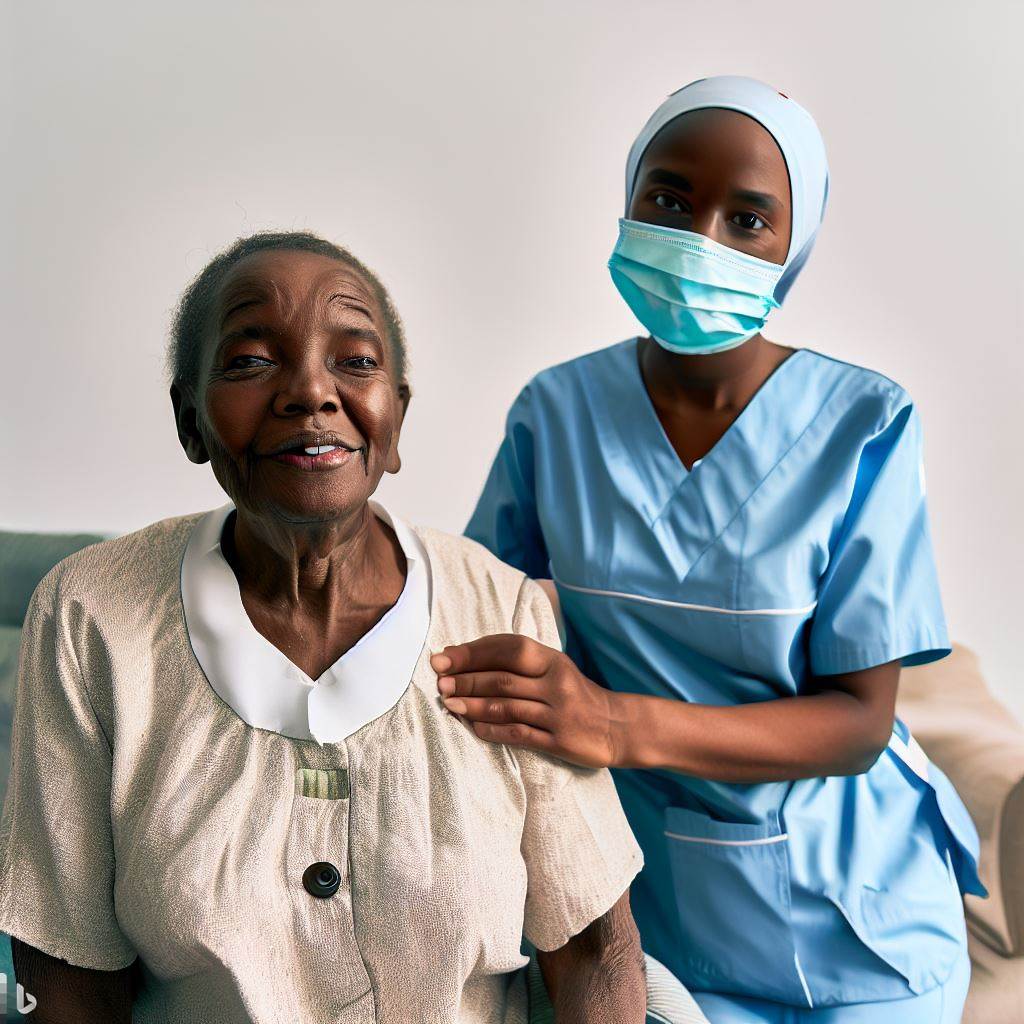Introduction
Nigeria’s healthcare system has made significant strides; however, it continues to confront numerous challenges.
The pivotal role played by healthcare professionals in enhancing this system and ensuring top-notch care delivery cannot be overstated.
Among these professionals, nurses emerge as a crucial and indispensable component, playing a central role in Nigeria’s healthcare landscape by providing holistic and patient-centered care.
Nurses are at the forefront of healthcare services, catering to the physical, emotional, and psychological needs of patients.
Moreover, their diverse skill set and compassionate approach empower them to address a wide array of health issues and ensure comprehensive patient well-being.
From administering medications to offering emotional support, nurses tirelessly work to deliver optimal care to those in need.
In the face of numerous obstacles, nurses remain resilient advocates for patients, striving to bridge gaps in the healthcare system and promote better health outcomes.
Their dedication and commitment contribute significantly to the ongoing improvement of Nigeria’s healthcare system.
Through their expertise and compassionate care, nurses truly embody the essence of quality healthcare provision, making them invaluable assets in the pursuit of a healthier nation.
Historical Background of Nursing in Nigeria
Development of nursing education and training
- Establishment of the first nursing school in Nigeria, known as the School of Nursing, Agodi, in 1921.
- Introduction of the nursing profession by Christian missionaries who provided basic training.
- Development of formal nursing education with the establishment of more nursing schools in the country.
- Gradual improvement and expansion of nursing curricula to meet healthcare demands.
Influence of colonialism on nursing profession
- Colonial rule brought about the introduction of Western medicine, including nursing practices.
- Nurses trained during the colonial era were mainly taught by foreign colonial nurses.
- Lack of representation and limited opportunities for Nigerian nurses under colonial dominance.
- Development of a hierarchical system within nursing, with foreign nurses occupying higher positions.
Evolution of nursing practices in Nigeria
- Transition from basic nursing care to specialized areas such as midwifery, psychiatric nursing, and anesthesia.
- Introduction of community health nursing to address healthcare needs in rural areas.
- Expansion of nursing roles to include leadership positions, education, and research.
- Introduction of advanced nursing programs to promote specialization and advanced practice in nursing.
Current State of Nursing in Nigeria
Nursing in Nigeria is currently facing critical challenges that impact the healthcare system and patient outcomes.
Nursing Workforce Statistics
The nursing workforce statistics reveal a severe shortage, with just one nurse for every 2,500 people.
Challenges Faced by Nurses in the Healthcare System
Despite their essential role, nurses encounter numerous obstacles in the healthcare system.
These challenges include inadequate resources, resulting in compromised patient care, prolonged working hours, and limited career advancement opportunities, hindering professional growth.
Salary and Compensation Issues for Nurses
Another pressing concern is the insufficient salary and compensation for nurses in Nigeria.
They receive low wages, suffer from delayed payments, and lack essential benefits, making it difficult to meet their basic needs and affecting overall job satisfaction.
Despite these adversities, nurses play a crucial role in delivering quality healthcare services to the population.
They remain dedicated to caring for patients, promoting wellness, and serving as a bridge between doctors and patients, ensuring effective communication and holistic care.
Addressing these challenges and recognizing the indispensable role of nurses is imperative to enhance healthcare delivery in Nigeria and uplift the nursing profession.
Adequate support, resources, and fair compensation are vital steps towards a healthier and more sustainable nursing workforce.
The Significant Contributions of Nurses in Nigeria’s Healthcare System
Primary care and outpatient services
- Nurses play a vital role in providing primary care services in Nigeria’s healthcare system.
- They are responsible for conducting initial patient assessments and creating personalized care plans.
- Nurses also administer medications and perform various medical procedures in outpatient settings.
- Their involvement ensures that patients receive timely and effective treatment for their ailments.
- Additionally, nurses provide education and counseling to patients and their families, promoting health and wellness.
Inpatient care and hospital settings
- Nurses have a crucial role in delivering quality inpatient care in Nigeria’s hospitals.
- They monitor patients’ vital signs, administer medications, and provide emotional support.
- Nurses also collaborate with other healthcare professionals to coordinate and manage patient care.
- They ensure patients’ safety, comfort, and wellbeing during their hospital stay.
- The expertise of nurses contributes to better patient outcomes and reduces the risk of complications.
Role in community health and health promotion
- Nurses play a significant role in community health initiatives and health promotion campaigns.
- They educate individuals and communities on disease prevention, healthy lifestyles, and self-care.
- Nurses conduct immunization programs, screenings, and health assessments to identify health risks.
- They advocate for public health policies and initiatives that improve the overall health of the community.
- Their involvement in community health programs helps ensure better health outcomes and reduced healthcare costs.
In review, nurses in Nigeria’s healthcare system are instrumental in providing primary care and outpatient services, inpatient care and hospital settings, as well as playing a vital role in community health and health promotion.
Their expertise and dedication contribute significantly to improving patient outcomes, promoting wellness, and reducing healthcare costs.
The significant contributions of nurses cannot be overstated in sustaining a robust and effective healthcare system in Nigeria.
Read: Exploring the Various Nursing Specialties in Nigeria

Specializations and Advanced Nursing Roles in Nigeria
Nurse practitioners and advanced practice roles
- Nurse practitioners in Nigeria provide primary healthcare services and have advanced clinical training.
- They can diagnose and treat common illnesses, prescribe medications, and provide health counseling.
- These nurses play a crucial role in ensuring access to quality healthcare, especially in rural areas.
- Advanced practice roles include nurse anesthetists, nurse midwives, and nurse psychotherapists.
- Nurse anesthetists administer anesthesia during surgical procedures, ensuring patient safety and comfort.
- Nurse midwives provide prenatal and postnatal care, deliver babies, and educate women on reproductive health.
- Nurse psychotherapists offer mental health counseling and support to individuals and families.
Educating and researching Nurses
- Nurse educators in Nigeria are responsible for training and mentoring the next generation of nurses.
- They teach in nursing schools and universities, sharing their knowledge and expertise.
- Nurse educators also contribute to curriculum development and ensure the quality of nursing education.
- Research plays a crucial role in improving nursing practice and healthcare outcomes.
- Nurse researchers in Nigeria conduct studies and contribute to evidence-based practice.
- They investigate healthcare trends, evaluate interventions, and develop innovative approaches.
Nurse leaders and policymakers
- Nurse leaders in Nigeria hold administrative and managerial roles in healthcare organizations.
- They oversee nursing departments, manage budgets, and ensure efficient healthcare delivery.
- Nurse leaders also advocate for the nursing profession, promote professional development, and mentor other nurses.
- Policymakers play a crucial role in shaping healthcare policies and regulations.
- Nurses in policymaking positions advocate for healthcare reforms, contribute to decision-making processes, and influence legislation.
- By representing the nursing profession, they ensure nurses’ voices are heard, and their perspectives are considered.
In fact, nurses in Nigeria have various specializations and advanced roles that contribute to the healthcare system.
Nurse practitioners provide primary care, while advanced practice roles like nurse anesthetists, nurse midwives, and nurse psychotherapists offer specialized services.
Nurse leaders and policymakers play important roles in administration, advocacy, and policymaking.
Additionally, these specialized roles demonstrate the diverse contributions and expertise of nurses in Nigeria’s healthcare system.
Read: Career Paths for Massage Therapists in Nigeria
Training and Education Opportunities for Aspiring Nurses in Nigeria
Overview of nursing education programs
- The nursing education programs in Nigeria provide comprehensive training to aspiring nurses.
- These programs include theoretical coursework as well as practical clinical experience.
- Students learn about various aspects of nursing, including patient care, health promotion, and disease prevention.
- The programs also focus on developing critical thinking, communication, and problem-solving skills.
- Nursing education programs in Nigeria are offered by universities, colleges, and nursing schools.
Accreditation and regulatory bodies in Nigeria
- The Nursing and Midwifery Council of Nigeria (NMCN) is the primary regulatory body for nursing education.
- The NMCN ensures that nursing programs meet the necessary standards and guidelines.
- Accreditation by the NMCN is essential for nursing programs to maintain their credibility and quality.
- Other regulatory bodies, such as the National Universities Commission, also oversee nursing education in Nigeria.
Scholarship and funding opportunities for nursing students
- In Nigeria, there are various scholarship and funding opportunities available for nursing students.
- The federal government, state governments, and private organizations offer scholarships to deserving candidates.
- These scholarships cover tuition fees, textbooks, and other expenses associated with nursing education.
- Financial aid programs, such as grants and loans, are also available to support nursing students.
- Additionally, nursing schools and universities may provide financial assistance or work-study programs.
Overall, aspiring nurses in Nigeria have access to a range of training and education opportunities.
The nursing education programs focus on providing a comprehensive understanding of nursing principles and skills.
Accreditation by regulatory bodies ensures the quality of these programs.
Furthermore, scholarships and funding options make nursing education more accessible to deserving students.
With these resources and support, aspiring nurses can receive the necessary training to contribute effectively to Nigeria’s healthcare system.
Read: The Journey of a Massage Therapist: Stories from Nigeria
Government and Policy Initiatives for Nurses in Nigeria
In Nigeria, the government and various policy initiatives have been implemented to support and empower nurses in the healthcare system.
Now, let’s delve into the role of nursing governance, professional associations, policies, regulations, and efforts to improve working conditions and professional growth for nurses.
Nursing Governance and Professional Associations
Nursing governance in Nigeria is primarily governed by the Nursing and Midwifery Council of Nigeria (NMCN).
The NMCN sets the standards for nursing education, practice, and registration, ensuring that nurses meet the required qualifications and competence.
Professional associations such as the National Association of Nigerian Nurses and Midwives (NANNM) play a vital role in advocating for the interests of nurses.
They strive to promote professional development, unity, and welfare of nurses across the country.
Policies and Regulations Affecting Nurse Workforce
Nigeria has implemented policies and regulations to address the challenges faced by the nurse workforce.
The National Health Act of 2014, for example, seeks to improve access to quality healthcare services, enhance working conditions, and regulate the healthcare profession.
Additionally, the government has focused on implementing policies to increase the number of qualified nurses in the country.
Initiatives such as the Basic Midwifery and Nursing Training Program aim to train and deploy more nurses to various healthcare facilities, especially in rural and underserved areas.
The government also recognizes the need for specialization in nursing.
Specialized nursing programs and certifications have been introduced to enhance the skills and expertise of nurses, such as critical care nursing, psychiatric nursing, and pediatric nursing.
Efforts to Improve Working Conditions and Professional Growth
The government and healthcare institutions in Nigeria are making efforts to improve working conditions and support the professional growth of nurses.
In particular, one such initiative is the provision of better remuneration packages and incentives for nurses.
These include hazard allowances, medical insurance coverage, and pension schemes to motivate and retain skilled nurses in the workforce.
Moreover, professional growth opportunities, such as continuous education and training programs, are being offered to nurses to enhance their knowledge and skills.
This enables them to provide better patient care and advance in their careers.
Moreover, the implementation of nurse-patient ratio policies ensures that nurses have manageable workloads, allowing them to deliver quality care.
This is particularly important in reducing burnout and improving patient outcomes.
Efforts are also being made to create a safe and conducive work environment for nurses.
Workplace violence prevention programs and policies have been introduced to address the issue of violence against healthcare workers, including nurses.
In short, the government and policy initiatives in Nigeria play a crucial role in supporting nurses in the healthcare system.
Nursing governance, professional associations, policies, regulations, and efforts to improve working conditions and professional growth all contribute to the overall development and empowerment of nurses.
Continued investment in nursing is essential for the provision of quality healthcare services in Nigeria.
Read: Massage Therapy Schools and Certifications in Nigeria
Collaboration with Other Healthcare Professionals
Interdisciplinary teamwork in patient care
- In Nigeria’s healthcare system, nurses play a crucial role as part of interdisciplinary teams in delivering patient-centered care.
- Nurses collaborate with doctors, pharmacists, and other healthcare professionals to provide holistic care to patients.
- These teams work together to develop comprehensive treatment plans and monitor patients’ progress.
- Nurses actively contribute their expertise, skills, and knowledge to ensure the best outcomes for patients.
- By working collaboratively, the healthcare team can address all aspects of a patient’s health and well-being.
- This collaboration leads to improved patient outcomes, increased efficiency, and enhanced healthcare delivery.
- Through effective communication and coordination, interdisciplinary teams can provide better care and prevent medical errors.
Nursing role in multidisciplinary healthcare teams
- Nurses in Nigeria are essential members of multidisciplinary healthcare teams.
- They serve as advocates for patients and bridge the gap between different healthcare professionals.
- Nurses bring a unique perspective to the team, considering the patients’ physical, emotional, and social needs.
- They ensure continuity of care by monitoring patients, administering medications, and providing educational support.
- Nurses collaborate with other professionals to implement evidence-based practices and promote patient safety.
- Their contributions are vital in achieving positive patient outcomes and reducing healthcare costs.
Examples of successful collaboration
- One example of successful collaboration is the integration of electronic health records (EHRs) in Nigeria’s healthcare system.
- Nurses work closely with IT specialists to ensure accurate documentation and seamless information flow.
- EHRs enable interdisciplinary teams to access patient records, make informed decisions, and improve care coordination.
- Another instance is the collaboration between nurses and psychologists in mental healthcare.
- Both professionals work together to provide comprehensive support and treatment for individuals with mental health issues.
- This collaboration enhances patient outcomes and promotes mental well-being in Nigeria.
- Nurses also collaborate with social workers and community health workers to address the social determinants of health.
- By working together, they can identify and overcome barriers to healthcare access and improve health equity.
- This collaboration is particularly important in rural areas where resources are limited.
Collaboration with other healthcare professionals is crucial for nurses in Nigeria’s healthcare system.
Whether it is through interdisciplinary teamwork in patient care or their role in multidisciplinary healthcare teams, nurses play a vital part in delivering quality and holistic care.
Examples of successful collaboration, such as integrating electronic health records and interdisciplinary approaches in mental healthcare, demonstrate the positive impact of nurses’ collaboration with other professionals.
By working together, healthcare teams can enhance patient outcomes, improve care coordination, and address healthcare challenges effectively.
Read: Occupational Therapy Schools: Where to Study in Nigeria
Conclusion
Nurses play a crucial role in Nigeria’s healthcare system by providing direct patient care, promoting health, and preventing diseases.
To elaborate, they are on the frontline, offering critical medical assistance to patients.
Furthermore, nurses actively engage in health promotion activities, aiming to improve the overall well-being of individuals and communities.
Additionally, they play a pivotal role in disease prevention, implementing strategies to reduce the incidence of illnesses and improve public health outcomes.
Despite facing challenges such as inadequate resources and limited career advancement opportunities, nurses also have exciting prospects for growth and development.
It is essential to acknowledge and support the contributions of nurses in healthcare. Their dedication and expertise improve the overall quality of patient care and outcomes.
Generally, nurses in Nigeria play a vital role in the healthcare system. They are the backbone of patient care, promoting health, and preventing diseases.
Despite facing challenges, nurses have opportunities for growth. It is crucial to support and recognize their contributions to ensure quality healthcare for all.




